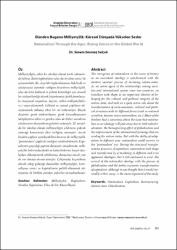Dünden Bugüne Milliyetçilik: Küresel Dünyada Yükselen Sesler
Abstract
Milliyetçiliğin, etkin bir ideoloji olarak tarih sahnesinde belirişi, Batılı toplumların ulus-devlet olma süreci ile eş zamanlıdır. İki yüzyıldır toplumlar arası ilişkilerde ve uluslararası sistemde varlığını hissettiren milliyetçilik, ulus-devletin kültürel ve politik bütünlüğü için önemli bir aidiyet kimliği olarak biçimlenmiş; farklı formlarıyla (nasyonal sosyalizm, faşizm, mikro milliyetçilikler, vs.) sosyo -ekonomik, kültürel ve siyasal yapıların dönüşümünde oldukça etkin bir rol üstlenmiştir. Birçok düşünür, gerek endüstrileşme, gerek küreselleşmenin tektipleştirici etkisi ve gerekse ulus-devletleri aşındırıcı uluslararası oluşumların gelişimi nedeniyle, 21. yüzyılda bir ideoloji olarak milliyetçiliğin yıldızının giderek söneceği konusunda fikir birliğine varmıştır. Ancak kendini çağlara uyarlayabilme becerisi ile milliyetçilik, “postmodern” çağda da varlığını sürdürebilmiştir. Kapitalizmin geçirdiği yapısal dönüşüm süreçlerinde, milliyetçilik birbirinden farklı ve hatta birbirine karşıt ideolojilere eklemlenerek şekillenmiş, dönüşmüş ancak yine de var olmaya devam etmiştir. Çalışmada, kaçınılmaz olarak solup gideceği düşünülen milliyetçiliğin, küreselleşme süreci ve kapitalizmin politik- ekonomik dönüşümü ile birlikte yeniden yükselişi tartışılmaktadır. The emergence of nationalism in the scene of history as an ascendant ideology is synchronical with the western societies’ process of becoming nation-states. As an active agent of the relationships among societies and international system since two centuries, nationalism took shape as an important identity of belonging for the cultural and political integrity of the nation-state, and took on a quite active role about the transformation of socio-economic, cultural and political structures with its different forms (such as national socialism, fascism, micro nationalism, etc.). Many of the thinkers had a consensus about the issue that nationalism as an ideology will fade away due to both industrialization, the homogenizing effect of globalization and the improvement of the international formings that are eroding the nation-states. But with the ability of adaptation to different eras, nationalism could survive in the “postmodern” era. During the structural transformation processes of capitalism, nationalism took shape and transformed by articulating to different and even opponent ideologies, but it still continued to exist. The revival of the nationalist ideology with the process of globalization and the politic-economic transformation of capitalism -although it was thought that it would inevitably wither away- is the main argument of the study.
Source
Anadolu Üniversitesi Sosyal Bilimler DergisiCollections
- Cilt.12 Sayı.3 [12]


















